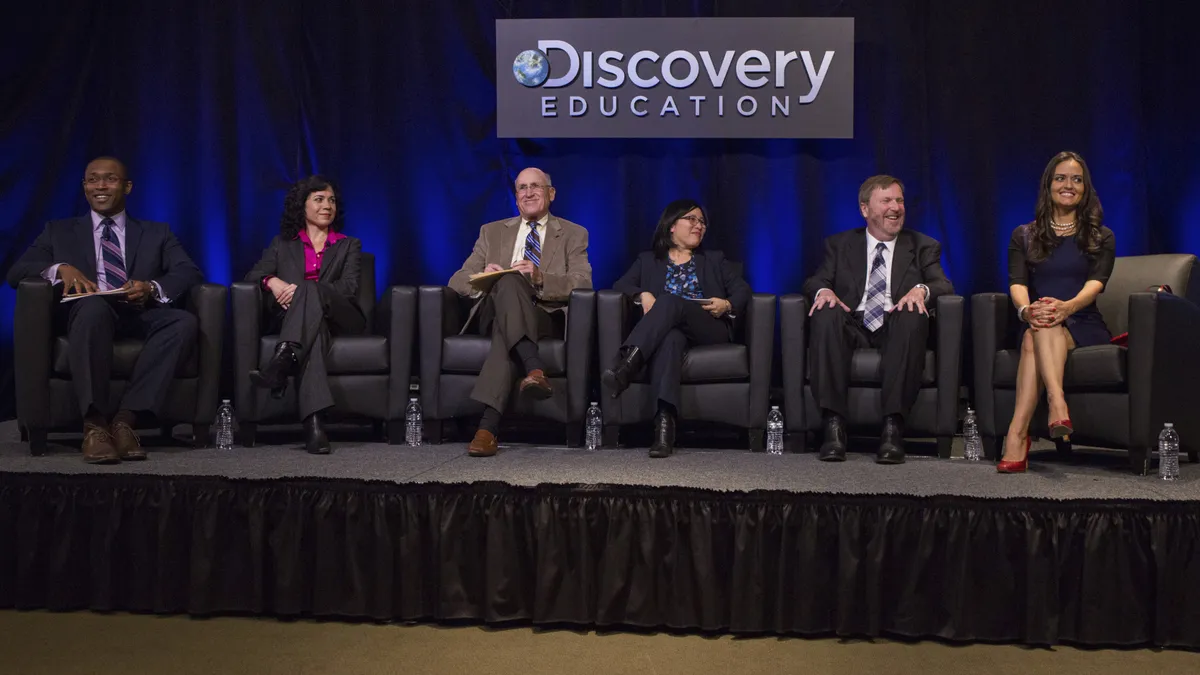At a Discovery Education event marking the launch of the company's new Math Techbooks Thursday, a panel of experts moderated by NBC News4 anchor Aaron Gilchrist discussed the state of mathematics education in America. The panel, which marked the launch of Discovery Education's new Math Techbook, focused on challenges faced by districts, the perception that only some students need math after school, and making teachers feel safe with new tech approaches and standards like Common Core.
On hand were Google Chief Innovation Evangelist Michele Weslander Quaid, McDaniel College Professor of Education and Common Core co-author Dr. Francis "Skip" Fennell, U.S. Assistant Secretary of Labor for Employment and Training Portia Wu, Mooresville (NC) Graded School District Superintendent Dr. Mark Edwards, and actress and best-selling author Danica McKellar.
Here are five key takeaways:
Districts must be "determined, resilient, and focused"
Referencing a preceding video message from University of Maryland Baltimore County President Dr. Freeman Hrabowski and citing lagging American student achievement compared to other industrialized nations, Gilchrist asked the panelists if the nation is, indeed, at a math education tipping point and what challenges districts are facing.
Edwards was first to respond, touting Mooresville's achievement and saying, "I really believe that the future is bright. I do think that we have to be determined, resilient, and focused on this effort."
Particularly inspiring to Edwards was Margaret Wheatley’s “Leadership and the New Science,” in which the author talked about science in terms of "fractals."
"I think our students learn in fractals," he added, noting that linear methods of teaching may not be the best for students anymore.
McKellar noted that when she was in seventh grade, she was terrified of math. "I was really struggling. I used to come home and cry because of my math homework," she told the audience. "I was just a typical scared student." When her teacher was switched midway through the year, however, she said the subject suddenly felt more "relaxed and fun," highlighting how the way content is presented often makes all the difference.
Quaid rounded out the point by noting that schools and districts must reach students at the early elementary level or risk losing them in later grades.
Students shouldn't be told they won't use certain math in the "real world"
Many students are given the perception, sometimes even by educators, that they "won't use certain types of math" (typically trigonometry or calculus) in the "real world" unless they choose to be something like a rocket scientist. The panelists agreed that this line of thinking is flawed, as many people, even outside of STEM fields, often use various complex math skills without even thinking about them.
Teachers, McKellar said, must show students how that math is applied in real-world situations. In her books, for example, she said that she'll talk about figuring out the exponential reach a cat video might have online. "Math is a language, and you can talk about anything in the language of math."
Educators must also teach students to tackle the challenge and find accomplishment in working hard at it.
Wu added, "I actually think maybe in our culture, we unteach people the things that are, frankly, natural to them," saying that when you give a child a choice between two halves of a cookie, the child unerringly goes toward the larger piece. Touching on previous points, she continued that kids must be presented with math in situations relevant to them, because not everyone has been on, say, a high-speed train.
Educators must feel like it's safe to try new approaches
In the current K-12 environment, with new standards and teacher evaluations based on high-stakes tests, it can be difficult or discouraging for educators to try new and innovative teaching methods. Fennell said that the U.S. has a "critical shortage" of math teachers at the secondary level, and that those teaching math at the middle school level sometimes don't even have a minor in math. Furthermore, he said, early childhood and elementary educators historically often don't have the mathematical knowledge for teaching.
The nation, Fennell said, must focus on providing ongoing professional development, retaining teachers, and making sure they have the confidence to not be worried about Common Core and other new standards. "We've certainly begun, but we're not anywhere near closure on it."
When it comes to the simultaneous rollout and implementation of new standards, assessments, and the teacher evaluations tied to them, Fennell added, "Is there any wonder why teachers are frustrated with all of this?" He also touched on the difficult situation administrators are placed in as far as what they can push back on and not get in trouble for, as well as the need to better explain the reasoning for new standards, like Common Core, that are focused on conceptual understanding as much as the problems and solutions.
Just as students must be nurtured and reassured when they try and then fail, so too must teachers, Edwards noted.
Effectively teaching math is critical for the jobs of the future
Gilchrist cited reports that a little more than half of the nation's jobs require a significant level of mathematical knowledge, and Wu responded that there's a million additional STEM jobs projected to be added to the economy over the next decade. "That forecast will probably change completely in two or three years. That's how fast technology is growing now."
At current achievement levels, the U.S. education system isn't ready to meet that demand, which, of course, is why the current push in focus on subjects like math and science is occurring. Figuring out how to use technology and other resources to to help teachers graduate more students proficient in those fields is key.
McKellar suggested that personalizing things like math problems with things that students are actually interested in — she mentioned her four-year-old son's interest in all things related to garbage trucks as an example — could be helpful. Edwards responded that the visualization, real-time feedback, and real-life depictions used in both the Math and Science Techbooks from Discovery are, from what he's seen, successfully doing that. "Nothing replaces hard work, but I think this sense of opportunity with the resources that we have today is a game changer and we are incredibly excited about it," he said.
Pulling from Apollo 13, Quaid added that, "We want the technology that gets us to space, but we also want the technology and the mindset, the skillset, the way they think when they lock everybody in the room and lay everything on the table, and say, 'This is what we have to get them home.'"
Teaching to the test or using a one-size-fits-all approach is no longer acceptable, Quaid said.
The math achievement gap with female and minority students is critical
McKellar, whose books are focused on encouraging girls to learn math, stated that when she does book signings and asks girls how they're doing in math, they might say they have an "A-" but that they don't understand it. A boy, on the other hand, might say he has a B+ and that he completely understands math. In this way, McKellar said, perception is critical for students and female students need more role models to encourage them.
There are also stereotypes that certain things aren't "for girls," Quaid added, telling a story about how an older girl told her daughter, "My mom says LEGOs aren't for girls." The next Christmas, she said, she bought LEGOs for that girl, as well, in an effort to nix stereotypes. Addressing beliefs like this are critical to improving achievement between genders.
Edwards added that teacher dispositions toward students are critical, as well. In Mooresville, he said, the motto is "Every child, every day." Educators in the district are reminded that all children, regardless of gender or race or socioeconomic status, have gifts and talents to bring to the table. "When there's a determination for every student, great things happen."
Would you like to see more education news like this in your inbox on a daily basis? Subscribe to our Education Dive email newsletter! You may also want to read Education Dive's look at 4 ways a Republican Congress could impact K-12 policy.






















